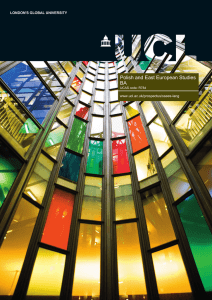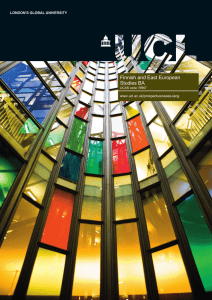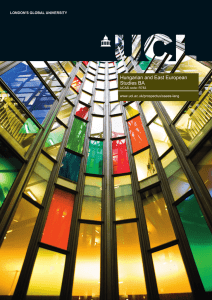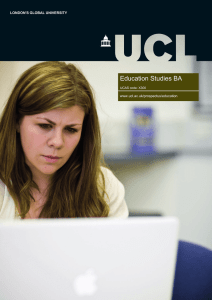Romanian and East European Studies BA LONDON'S GLOBAL UNIVERSITY www.ucl.ac.uk/prospectus/ssees-lang
advertisement
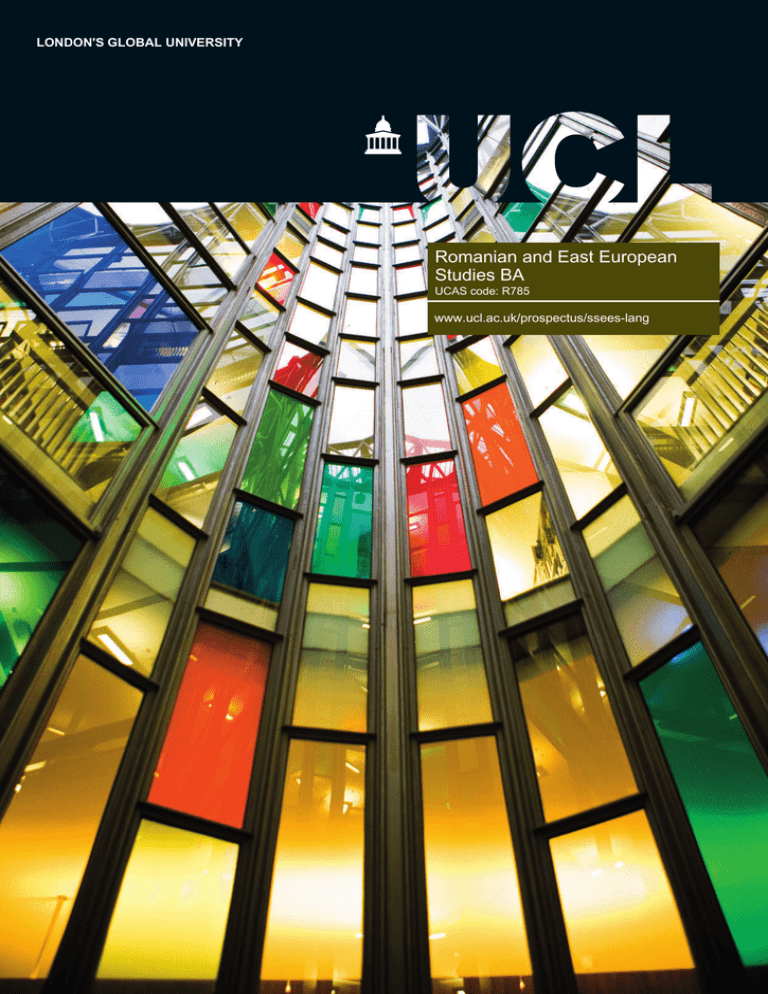
LONDON'S GLOBAL UNIVERSITY Romanian and East European Studies BA UCAS code: R785 www.ucl.ac.uk/prospectus/ssees-lang Romanian and East European Studies BA Romanian is a Romance language spoken not only in Romania, but also in the Republic of Moldova, and in parts of the former Yugoslavia and Hungary. This programme offers the opportunity to gain excellent language skills and knowledge of Romanian literature, history and culture, preparing you for a wide variety of careers. Degree summary • The courses in Romanian at UCL SSEES are unique in the UK and seek to offer insights into how the Romanians see themselves, focusing on notions of 'roots', 'identity', and 'the frontier'. • UCL SSEES is the largest national centre in the UK for the study of central, Eastern and south-east Europe and Russia. The SSEES Library contains over 400,000 books, journals and film resources. • Students benefit from frequent visits and lectures by the most prominent, political, artistic and academic figures - prime ministers, foreign ministers, professors and writers. • Enjoy the huge benefits of studying in London, a global city with sizeable east European communities, and a host of cultural events with an east European dimension. Your degree will train you to the highest level of proficiency in speaking, writing and understanding in your chosen language(s) whether you begin with no prior knowledge or already have a good command of the language. As you progress through the degree, compulsory language courses are tailored to your existing knowledge, and you also take a compulsory literature course each year. You are encouraged to develop and pursue your own interests through choosing options from within three pathways: • • • Language and Literature Social Science History Your third year is spent abroad, which not only brings the language and culture you are studying to life, but also strengthens your resourcefulness and self-reliance. You will normally spend this year studying at a university in your chosen country, but alternatives, such as work placements, may be possible. Your learning Language teaching benefits from dedicated resources, including technological support through computer-aided language learning facilities, video and DVD materials, and the internet. The methods we will use to teach and assess you are varied, to ensure that they are best suited to the knowledge and skills being imparted or measured. Assessment will include written, oral and aural examinations, presentations, extended essays and the project you undertake during your year abroad. Your career The programme is designed to equip you with language fluency, cultural competence, historical knowledge and social understanding. Your ability to consider issues from an international perspective will be greatly enhanced and you will learn how to conduct research and to communicate effectively both orally and in writing. With developed skills in critical reasoning, independent thinking and application of theoretical concepts you will be strongly placed to find employment in international organisations, particularly careers which cross international boundaries and use languages. Career prospects are likely to include finance, media, diplomacy, education, translation, research, and consultancy. First destinations of recent graduates (2010-2013) from related SSEES BA programmes at UCL include: • • Financial Analyst, Morgan Stanley • • • Full-time student, PGCE at the University of Cambridge Full-time student, MSc in Comparative Politics at London School of Economics and Political Science Accountant, Takeda SCE Fashion Assistant, Wonderland Magazine Degree structure In each year of your degree you will take a number of individual courses, normally valued at 0.5 or 1.0 credits, adding up to a total of 4.0 credits for the year. Courses are assessed in the academic year in which they are taken. The balance of compulsory and optional courses varies from programme to programme and year to year. A 1.0 credit is considered equivalent to 15 credits in the European Credit Transfer System (ECTS). Year One Compulsory courses Literature and Memory War Trauma and Memory in East European Cinema Romanian Language Optional courses You will select 2.0 credits from a wide range of course options. Year Two Compulsory courses Romanian Language Romanian Literature 1 Optional courses You will select 2.0 credits from a wide range of course options. Year Three Year abroad in your chosen country Final Year Compulsory courses Romanian Language or Freestanding Dissertation Romanian Literature 2 Optional courses You will select 2.0 credits from a wide range of course options. Entry requirements A levels also meet with a member of the teaching staff on your chosen degree programme. Fees A level grades AAB-ABB UK/EU fee £9,000 (2016/17) A level subjects No specific subjects. Overseas fee £16,130 (2016/17) AS levels For UK-based students a pass in a further subject at AS level or equivalent is required. Notes Details about financial support are available at: www.ucl.ac.uk/study/ug-finance GCSE English Language and a foreign language (other than Ancient Greek, Biblical Hebrew or Latin) at grade B, plus Mathematics at grade C. Contacts Contact IB diploma Miss Lisa Walters Senior Admissions Officer IB points 34-36 Email l.walters@ucl.ac.uk Subjects A score of 16-17 points in three higher level subjects, with no score lower than 5. Telephone +44 (0)20 7679 8830 Prospectus entry www.ucl.ac.uk/prospectus/ssees-lang Other qualifications Full lists of all degree programmes and other entry requirements can be found on our website at: www.ucl.ac.uk/otherquals Undergraduate Preparatory Certificates UCL's Undergraduate Preparatory Certificates (UPCs) are intensive one-year foundation courses for international students of high academic potential, who are aiming to gain access to undergraduate degree programmes at UCL and other top UK universities. For more information see our website: www.ucl.ac.uk/upc Your application Application for admission should be made through UCAS (the Universities and Colleges Admissions Service). Applicants currently at school or college will be provided with advice on the process; however, applicants who have left school or who are based outside the United Kingdom may obtain information directly from UCAS. We will be particularly interested in your motivation for choosing this programme. In addition to academic requirements, you should demonstrate an aptitude for and interest in language study, and relate how your interest in Eastern Europe was initiated. Literature, history and culture are key elements of the degree, and your interest in and experience of these fields of study are important. If you are successful in obtaining an offer and you live in the UK, you will normally be invited for an applicant open day, comprising introductory talks about UCL SSEES and your degree, and a tour of UCL. You will PDF Updated: February 20, 2016 Information correct at time of going to press. See website (www.ucl.ac.uk/prospectus/ssees-lang) for latest information Key facts REF 64% rated 4* (‘world-leading’) or 3* (‘internationally excellent’) Department SSEES - School of Slavonic & East European Studies Faculty School of Slavonic & East European Studies
